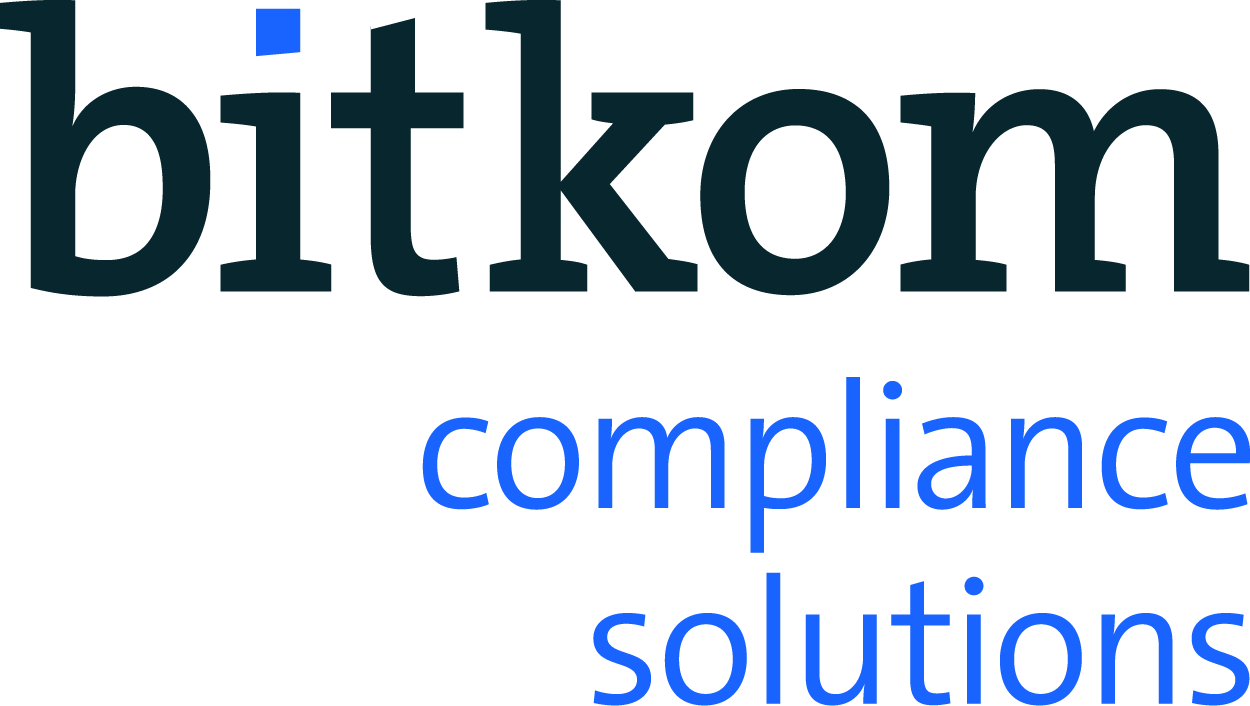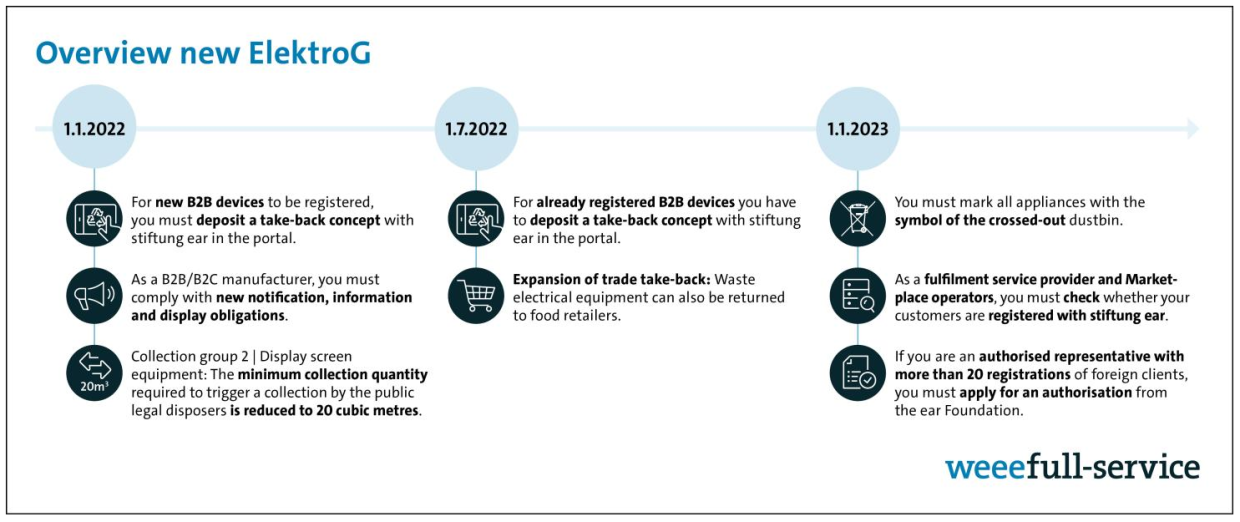The Electrical and Electronic Equipment Act
1. Are you manufacturer oder distributor of B2B devices?
B2B manufacturers must deposit their take-back concept in the ear portal
(from 1 January 2022 for new registrations | 30 June 2022 for registered manufacturers)
Whereas manufacturers of B2B equipment were previously able to contractually transfer disposal responsibility to their customers, this will no longer be possible in future. Only the financing of the disposal can be imposed on the customer. This means that manufacturers of B2B equipment must in any case have a take-back concept for their old equipment. This must contain:
- A declaration that the manufacturer/authorised representative has set up return facilities,
- If a third party has been commissioned, its name and address,
- A description of how the waste holder can access the return facilities.
Further information & offer: ElektroG To Do: Take-back concept
Marking with the crossed-out dustbin applies to all appliances
(31 December 2022 also for B2B devices)
Until now, the labelling obligation only applied to B2C appliances. With the amendment of the ElektroG, it will also be extended to B2B appliances.
Kennzeichnung mit der durchgestrichenen Mülltonne gilt für alle Geräte
(31. Dezember 2022 auch für B2B-Geräte)
Bislang galt die Kennzeichnungspflicht nur für B2C-Geräte. Mit der Novelle des ElektroG wird sie auch auf B2B-Geräte ausgeweitet.
2. Are you manufacturer of B2C or B2B devices?
Change in information obligations towards the end user (1 January 2022)
Producers must already inform consumers about the following when offering the products:
- Obligation for separate disposal
- Obligation to take back batteries (in future also lamps)
- Obligation of distributors to take back old appliances free of charge
- return options created
- End-users' own responsibility with regard to deletion of personal data
- Meaning of the symbol of the crossed-out dustbin
- B2C: information on homepage is not sufficient - it must be enclosed with the product
- Information on compliance with collection and recovery quotas (already provided by Waste Framework Directive, reference to BMU possible)
Changes to notification and reporting obligations (from 1 January 2022)
Notification obligations: Producers - regardless of whether with B2B or B2C registration - must in future take re-imports into account when determining the quantities placed on the market, as well as including taken-back and second-hand exported equipment when reporting so-called "indirect export quantities".
Obligation to notify: For manufacturers/authorised representatives and commissioned third parties who voluntarily take back B2C equipment themselves, the obligation to notify their take-back system, including take-back points, does not apply.
Here you will find a summary of the producer obligations with sample texts.
3. Are you retailer?
Extension of the retailer take-back (from 1 January 2022)
Distributors are exempt from notifying their take-back points. Nevertheless, they still need an active account in the ear portal to fulfil their reporting obligations.
The collection of category 1, 2 and 4 appliances within the scope of the 1:1 take-back must now explicitly be free of charge. In addition, the possibilities for return must already be pointed out when the products are offered.
Transition period until 30. June 2021:
Whereas up to now consumer electronics stores, do-it-yourself stores and other distributors with a sales area for electrical and electronic equipment of at least 400 square metres were obliged to take back WEEE, in future this will also apply to food retailers with a total sales area of at least 800 square metres who also offer electrical and electronic equipment several times a calendar year or on a permanent basis and make it available on the market.
4. Do you place B2C display appliances on the market?
Minimum collection quantity in the display screen group decreases (from 1 January 2022)
From 2022, the minimum collection quantity required to trigger a collection of group 2 (display screen equipment) by the public waste management authorities (örE) will be reduced to 20 cubic metres. From then on, the same one-day grace period will also apply to the placement of containers at transfer points as already applies to the collection of full containers.
5. Are you a Marketplace operator, fulfilment service provider, authorised representative or operator of primary treatment facility?
Extended responsibilities for marketplace operators and fulfilment service providers (from 1 January 2023)
Operators of electronic marketplaces as well as fulfilment service providers are no longer allowed to offer or provide equipment of non-registered customers or to pack, store, address and ship it. For this purpose, they must check from 2023 whether their customers are properly registered with stiftung ear.
Authorisation procedure for larger authorised representatives (from 1 January 2023)
With the audit requirement for marketplace operators and fulfilment service providers, the number of foreign companies registered via authorised representatives will also increase significantly. Therefore, authorised representatives who hold more than 20 registrations for one or more clients at stiftung ear will have to be approved by the foundation in the future.
Changes for operators of primary treatment plants
What is new for operators of primary treatment facilities is that from 2022 they will also be subject to comparable annual notification obligations as manufacturers, opting public authorities and distributors. On the other hand, the annual reporting obligation of owners who are obliged to dispose of waste to stiftung ear will no longer apply.
The existing notification obligation for operators of primary treatment facilities will be extended: In future, each plant site must be notified separately, the categories and waste management activities treated there must be specified and a valid certificate for the site must be provided. The information and certificate will be subject to a fee-based audit by stiftung ear. Implausible data or an invalid certificate will lead to the deletion of the entry of the primary treatment facility in the register.
History of the ElektroG
2022 – Amendment | ElektroG3
The German ElektroG is currently being amended and a new version is expected to come into force in 2022.
These are the most important modifications for manufacturers and traders:
- Inclusion of food retailers in the obligation to take back old electrical appliances, provided they have more than 800 square metres of shop space and offer electrical appliances several times a year. (from 01.07.2022)
- An audit obligation for online marketplaces and fulfilment service providers with regard to registration with stiftung ear will be introduced. (from 01.01.2023)
- It must be possible to remove used batteries and accumulators without any problems and without destroying them, and with commercially available tools.
- The container sizes that producers place with public waste management authorities must be reduced from 30 to 20 cbm.
- New reporting obligations:
1. Separate quantity reporting of second-hand equipment outside Germany.
2. Details of the authorised representative in the case of distance selling outside Germany. - Extension of the term "placing on the market" by making an electrical appliance available on the German market again, which was exported from Germany.
Read related news with further information here.
2018 – Open Scope
15 August 2018: Transition to so-called "Open Scope", using 6 categories. This means that more electronic devices fall under the ElektroG.
Read more about the Open Scope here.
2016/17 – Transition period
1 July 2017: Changes in the retail take-back obligation:
- Fines of up to 100,000 € for failure to meet retail take-back obligation
- Specification of number of electrical devices that sellers and manufacturers must take back from consumers: 5 end-of-use products per type of Equipment
- Fines of up to 10,000 € for companies that are obliged to take back equipment and fail to appoint a Waste Management Officer
24 July 2016: Retail industry obliged to take back equipment and indicate collection points (retail take-back obligation)
24 April 2016: (Re)registration of companies without offices in Germany via authorised representative
1 February 2016: Reassignment of electrical and electronic equipment to collection groups
24 January 2016: Obligation to register lamps and photovoltaic modules
2015 – Amendment | ElektroG 2
24 October 2015: The German ElektroG has been amended.
2005 – Enactment | ElektroG
24 March 2005: The ElektroG has come into force in Germany.

